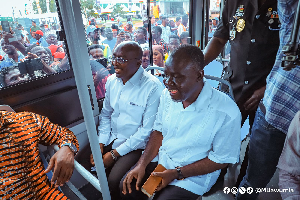By Alex Bossman Baafi
Debt is borrowing money from outside source with the promise to return the principal in addition to an agreed – upon level of interest. Although debt tends to have a negative connotation, startup companies often, turn to debt to finance their operations. The most popular source for debt financing is the bank but a private company or even a friend or a family member can also issue debt.
In much the same way, a government can also result to debt financing to prosecute its development programmes and our country is no exception.
One advantage of debt financing is maintaining ownership. That is when you borrow from the bank or another lender, you are obligated to make the agreed – upon payments on time and that is the end of your obligation to the lender. One can also take advantage of lower interest rate to borrow. However, there are also drawbacks to debt financing. As mentioned above, though your sole obligation to the lender is to make repayments but the unfortunate thing is that even if your business falls or fails, you will still have to make these payments. You may also have to pay higher interest rate. Interest rates will vary with macroeconomic conditions, your history with the bank, your business credit rating and your personal credit history.
This article was motivated by the heated argument that ensued between the Chairman of Finance Committee in Parliament, honorable James Klutse Awadzi and Member of Parliament for Ahafo Ano South, Stephen Kwaku Balado Maanu, on Okay FM flagship morning programme, dubbed “ade akye abia” literally mean “Is yet another morning” that took place on Friday August 17 this year. Whilst honorable Balado Maanu bemoaned the serious indebtedness path the nation is fast treading and its negative long-term implications on the future generations of this country, honorable James Klutse Awadzi hailed it as the best way to go given the circumstances of our nation.
The fact of the matter is that, the rate of growth of public debt of this country is a matter of concern to the good people of this country. The total debt of this country increased from $3.9 billion in 2008 to $7.1 billion by 2011 showing an increase by 82%. This is excluding the $3.0 billion China Development Bank loan and many others that had been borrowed thereafter. The country’s total public debt has increased from GHc 9.6 billion in 2008 to GHc 25.3 billion, an increase of 164% just within a little over 3.5 years of this NDC Administration. Financial analysts believe that the stock of public debt that has been accumulated within this short period of Mahama administration is higher than the stock of public debt accumulated by all the governments since independence up to the end of Kuffour administration in 2008. That is shocking.
What is making many Financial Analysts worried is that it is very difficult to identify productive infrastructural projects that this huge borrowed money has produced that guarantee smooth repayments when they fall due. If this argument is anything to go by, then we are being reckless with our debt financing because we are simply mortgaging the resources of this nation to our lenders and that will deny the future generations of this country to lead any meaningful socio-economic lives. Huge size of the borrowed money have ended up in certain individuals’ pockets through corruption and inflated contract prices.
Prudent “leverage” practice requires that even if you plan to use a loan to invest in an important asset or infrastructure as in the case of a nation, you need to make sure the asset will generate sufficient cash flows by the time repayment starts. In addition, you will be required more often than not to put up collateral on loans in case you default on repayments. Most of our lenders demand certain conditionalities that are inimical to the well-being of our people.
The Highly Indebted Poor Countries (HIPC) initiatives opportunity came but once. Therefore, this government should not mislead us into thinking that the country can afford to go to HIPC one more time, never. The mad rush to borrow money for political expediency by embarking on not thought through shoddy projects just to win elections through the ballot box does not make economic sense to me.
In my opinion, we must work hard as a nation; make judicious use of our resources whilst fighting corruption seriously. We must eschew the habit of borrowing all the time.
According to Proverbs 22:7, “The rich rules over the poor and the borrower become the lender’s slave”. How long are we going to remain slaves to the World Bank, IMF and the Chinese?
Email: abkbossman@yahoo.co.uk
Opinions of Monday, 20 August 2012
Columnist: Baafi, Alex Bossman


















